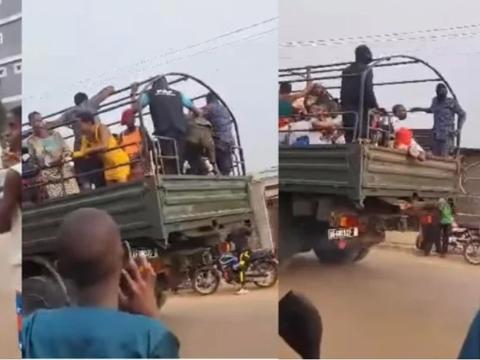By Sorie Ibrahim Fofanah
In the last three weeks or so the main news in this country has been the deportation or as some would say repatriation of hundreds of Sierra Leoneans from neighboring Guinea. Most people are using the word deportation so I checked it up in the Oxford Advanced Learners Dictionary and it basically talks about the act of forcing someone to leave a country, usually because they have broken the law or do not have legal right to be there.
Over 700 Sierra Leoneans woke up one morning to find their slum settlement under attack by Guinean agents. They were bundled into vehicles with whatever little belongings they were able to put together and driven to the border town of Pamalap and told they had no place in Guinea. That action has threatened the fantastic bilateral relationship between Sierra and Guinea in a matter never experienced before in the Mano River Union basin.
The recent mass deportations of hundreds of Sierra Leone citizens, living in neighboring Guinea under a junta regime, has however sparked widespread condemnation from some members of the public and even raised serious concerns by Sierra Leonean authorities. This diplomatic spate has garnered media coverage as well, of which Politico decides in this article to look at what will be the socioeconomic and security impacts on both countries if there seems to be any diplomatic rift that would affect development either directly or indirectly.
Guinea accused the deportees of engaging in anti-social activities like prostitution, drug peddling, theft, in general creating a culture of criminality in the communities they occupied. According to them, those Sierra Leoneans were now a threat to the security of Guinea and its Islamic and cultural values – very serious charges indeed.
At the border, Sierra Leonean security forces initially refused to allow the deportees in because they wanted to be sure they were indeed Sierra Leoneans. That speaks directly to the fact that the accepted international process of carrying out any deportation was not followed by Guinea. The stand-off that ensued could easily have deteriorated into something totally unimaginable. The Guineans closed their border.
The Vice President of Sierra Leone, Mohamed Juldeh Jalloh hurriedly traveled to the border to meet the affected Sierra Leoneans and assess the general situation. The was re-opened a few days later, once the deportees were allowed to step on Sierra Leonean soil and the foreign minister of Guinea was on his way to Freetown for talks.
When the Guinean authorities finally got down to talking to our diplomats in Conakry they simply doubled down and defended their action and then smuggled the idea of the deportees being undocumented and had been notified of the decision to clear their slum dwelling into conversation. Of course, our diplomats were not amused because Guinea failed to follow international best practice in conducting diplomatic relations.
On our side, some police officers conducted a raid in mainly business zones around Freetown and picked up dozens of mainly Fullah people. Recent statistics say that Fullahs make up the third largest tribe in Sierra Leone but most Sierra Leoneans regard them as Guineans and that even those who were born here display more loyalty to Guinea than Sierra Leone. I don’t want to litigate that now. Those brief arrests caused outrage, not just among the Fullahs but people from other tribes who think such tit for tat action was uncalled for and un-Sierria Leonean.
The Fullah Progressive Union (FPU) which looks over the interest of that tribe, on December 16, 2024, condemned what they described as wrongful targeting, harassment and detention of peaceful and innocent Sierra Leonean Fullahs. “We find it deeply troubling that innocent Fullahs were reportedly being labeled as undocumented foreigners arrested and detained. This shameful act of ethnic profiling and systematic harassment is a serious affront to Sierra Leone’s constitution and the values of inclusion, unity and justice, “a statement said.
The FPU also organized a news conference where the Secretary General, Abdulai Barrie directly accused the Sierra Leone Police of only targeting and detaining about 100 Fullah compatriots who he said were arrested in places which are not known for criminal activity.
Reacting to the widespread concerns of Sierra Leonean security forces arresting and detaining some members of the Fullah ethnic group, the government of Sierra Leone through the Ministry of Information and Civic Education condemned what it says are acts of intimidation, unwarranted arrests and harassment against the Fullah community by “certain elements within the security forces”. The government statements argued that the action by some security people does not represent the directives of President Julius Maada Bio or the government of Sierra Leone and promised an investigation.
So how did President Julius Maada Bio react to all this? In his meeting with the Guinean Foreign Affairs, Morissanda Kouyaté, Bio posted on social media that he had expressed concerns regarding what the President termed “poor treatment of Sierra Leonean citizens in Conakry. “Bio also noted in that social media post how it was essential that the two countries work to address challenges through “constructive “engagement.
The Sierra Leone Minister of Foreign Affairs, Musa Timothy Kabba in his meeting with his Guinean counterpart called the action by the Guinean authorities undiplomatic, unfriendly, improper and barbaric. Kabba then told journalists at a news conference that the government had wanted to expel the Guinean ambassador to Sierra Leone, but they decided to choose a diplomatic route out of the situation.
The point is, Sierra Leone and Guinea for a long time now have been grappling with another festering wound on our south-eastern border, in the town of Yenga. The Guinean forces still have their military base there, refusing to give back territory they occupied while helping Sierra Leonean beat a rebel insurgency that ravaged this country for 11 years. So, the last thing the two nations should desire is to open another front of disagreement.
Second, the diplomatic row over the deportations could easily lead to the closure of borders with serious consequences for trade and movement as both countries heavily rely on each other.
Sierra Leone and Guinea have no choice but to ensure lasting diplomatic discussions and never again dream of any deportations of their citizens without due process.
The third point the writer would like to note is that there are many Sierra Leoneans in Guinea who have established themselves investment wise in that country. The same is the case of thousands of Guineans who have massive investments in Sierra Leone. So, a diplomatic tension of deportation will lead to something else, like the confiscation of property and the serious disruption of family life.
Sierra Leone and Guinea share similar social and cultural features. Interesting to know that there is cultural similarity, specifically of intermarriage between Sierra Leone and Guinea. This has helped some of the children born to Sierra Leonean and Guinean parents gain citizenship in both countries. Why sacrifice all of that in a region that is so volatile?
© Copyright (2024) Politico (23/12/24)









